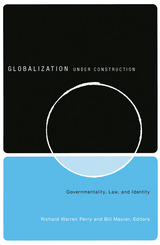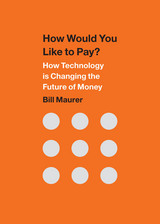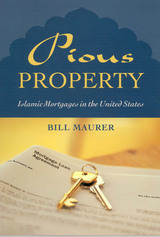3 books about Maurer, Bill

Globalization Under Construction
Govermentality, Law, and Identity
Richard Warren Perry
University of Minnesota Press, 2003

How Would You Like to Pay?
How Technology Is Changing the Future of Money
Bill Maurer
Duke University Press, 2015
From Bitcoin to Apple Pay, big changes seem to be afoot in the world of money. Yet the use of coins and paper bills has persisted for 3,000 years. In How Would You Like to Pay?, leading anthropologist Bill Maurer narrates money's history, considers its role in everyday life, and discusses the implications of how new technologies are changing how we pay. These changes are especially important in the developing world, where people who lack access to banks are using cell phones in creative ways to send and save money. To truly understand money, Maurer explains, is to understand and appreciate the complex infrastructures and social relationships it relies on. Engaging and straightforward, How Would You Like to Pay? rethinks something so familiar and fundamental in new and exciting ways. Ultimately, considering how we would like to pay gives insights into determining how we would like to live.
[more]

Pious Property
Islamic Mortgages in the United States
Bill Maurer
Russell Sage Foundation, 2006
Owning a home has always been central to the American dream. For the more than one million Muslims in the United States, this is no exception. However, the Qur'an forbids the payment of interest, which places conventional home financing out of reach for observant Muslims. To meet the growing Muslim demand for home purchases, a market for home financing that would be halal, or permissible under Islamic law, has emerged. In Pious Property, anthropologist William Maurer profiles the emergence of this new religiously based financial service and explores the ways it reflects the influence of Muslim practices on American economic life and vice versa. Pious Property charts the development of Islamic mortgages in America, starting with Islamic interpretations of the prohibition against riba—literally translated as "increase" but interpreted as "usury" or "interest." Maurer then explores the different practices that have emerged as permissible options for Islamic homebuyers—such as lease-to-own arrangements, profit-loss sharing, and cost-plus contracts—and explains how they have gained acceptance in the Islamic community by relying on payment schemes that avoid standard interest rate payments. Using interviews with Muslim homebuyers and financiers, and in-depth analysis of two companies that provide mortgage alternatives to Muslims, Maurer discovers an interesting paradox: progressive Muslims tend to use financial contracts that seemingly comply better with the prohibition against interest, while traditional Muslims seem more inclined to take on financing very similar to interest-based mortgages. Maurer finds that Muslims make their decisions about using Islamic mortgage alternatives based not only on the views of religious scholars, but also on their conceptions of how business is supposed to be conducted in America. While one form of Islamic financing is seemingly more congruent with the prohibition against riba, the other exhibits more of the qualities of American mortgages—anonymity and standardized forms. The appearance that an Islamic financing instrument is legal and professional leaves many Muslim homebuyers with the impression that it is halal, revealing the influence of American capitalism on Muslim Americans' understanding of their religious rules. The market for halal financial products exists at the intersection of American and Islamic culture and is emblematic of the way that, for centuries, America's newcomers have adapted to and changed the fabric of American life. In Pious Property, William Maurer explores this rapidly growing economic phenomenon with historical perspective and scholarly insight.
[more]
READERS
Browse our collection.
PUBLISHERS
See BiblioVault's publisher services.
STUDENT SERVICES
Files for college accessibility offices.
UChicago Accessibility Resources
home | accessibility | search | about | contact us
BiblioVault ® 2001 - 2024
The University of Chicago Press









